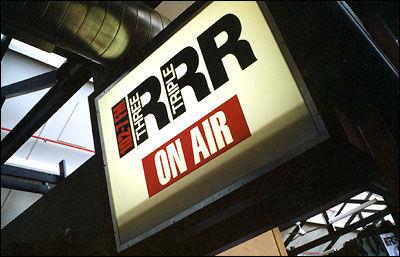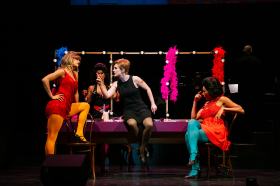Many community stations in our capital cities will be forced to ‘turn-off’ their digital radio services soon, thus falling way behind their commercial counterparts and forcing listeners to turn to other sources.
I’ve heard a lot about how the shortfall in government funding is threatening community radio lately, but maybe that’s because a large portion of my media diet is served up by community radio. The sector is disappointed this week after missing out in the Federal Budget on the $1.4 million it needs to fully fund the roll-out of digital transmission.
It’s not hard to see how such an event could threaten the long-term survival of these stations as presumably, like TV, analogue radio will be phased out at some point soon. Like many musicians, I’m horrified at the thought of the community radio falling by the wayside. My first ‘air-play’ was on Melbourne station 3RRR, and my first interview on PBS FM. But am I just being sentimental?
After all, these days I can get my music out via the web and, to be honest, I can find community driven news, debate and information online too. Assuming I’m on a good mobile data-plan, I can even plug my smart phone into the AUX socket of my car stereo and let some pre-programmed ‘internet radio station’ with almost zero overheads play new and old songs from my favourite genres to me all day long.
Perhaps community radio is an outdated concept – one that served its purpose for many years but is now destined to go the way of the betamax video tape, the hard copy street directory or, dare I say it, the compact disc?
I’ve been mulling over this article for a little while now. I’ve wanted to explore the issue at hand – and I’ve wanted to conclude that Community Radio is viable, necessary and worthy of us all marching down to the steps of parliament to picket until we know that its future is not only funded, but protected by some kind of Royal decree. I’ve wanted to go in to bat for community radio because I love it. I could not stand to lose it.
From a musician’s perspective, I thought I could make a pretty strong case, because, despite there being a ‘necessary evil’, social media sites like Twitter, Facebook or even Myspace don’t quite replace radio. None of these platforms really encourage folks to listen to a whole song – particularly not a new song from a new artist. Community Radio, on the other hand, puts the song in the fans’ ears, leaving them with only one choice – listen or switch stations!
But then again, those pre-programmed internet stations do the same thing. What’s more, there’s thousands of them, all covering different genres, with little or no talk and only occasional ‘sponsors’ messages’. These stations are good, dammit, and I’ve even started listening to them regularly myself. I’m discovering new artists, enjoying old ones and hardly ever “touching that dial”. Yes, my mobile data usage is going up but I can only assume that the costs will come down over time. I’m also aware that, as an artist, it’s not terribly hard to get placed on these stations, suggesting that the avenues for new talent are far from closed.
To be honest, after a couple of weeks of ‘research’ for this piece I was starting to believe that perhaps my sentimentality had gotten the better of me, particularly when I thought about all the blogs I visit regularly, covering topics and themes from music to food to issues and current affairs. Truth is, community radio’s content is replicated everywhere on the web, in every language imaginable.
But then it hit me. Something’s missing in all these new-fangled information sources that I could so easily see myself turning to for good – it’s the very word ‘community’. Even if you can replace the musical content with Internet Radio, and the news, current affairs, and lifestyle content with the myriad of blogs and online journals, you can never quite replace that community aspect. It is the bringing together of all this content with people that makes community radio – people who are experts in their field (or musical genre) and host shows, people who listen (from their cars or their lounge rooms or their back porches) to the very same thing at the very same time. These people interact, whether they realise it or not – and feed off each other. They all, together, regulate the content, live and in the moment, democratically.
Online, a web-master can delete a comment, block a user or even get rid of the original content. On radio, the audience is in the moment – every song, every opinion, every breaking news story, book review or even recipe is permanent and indelible, the message instant and direct.
I might be sentimental – but it’s for a good cause. Community Radio is, as a musician friend put it, a pillar of our society. It is a critical, accessible, inclusive form of Freedom of Speech – even if in some cases it only goes as far as a DJ telling you his or her favourite songs of the moment.
I shall, as has been urged by the recent campaign, commit to community radio. I believe it can share a space in our hearts and minds with our favourite blogs, news sites and even internet radio stations. And were I in a position to issue a Royal Decree in protection of our beloved community stations I would do so. Without a second thought.






